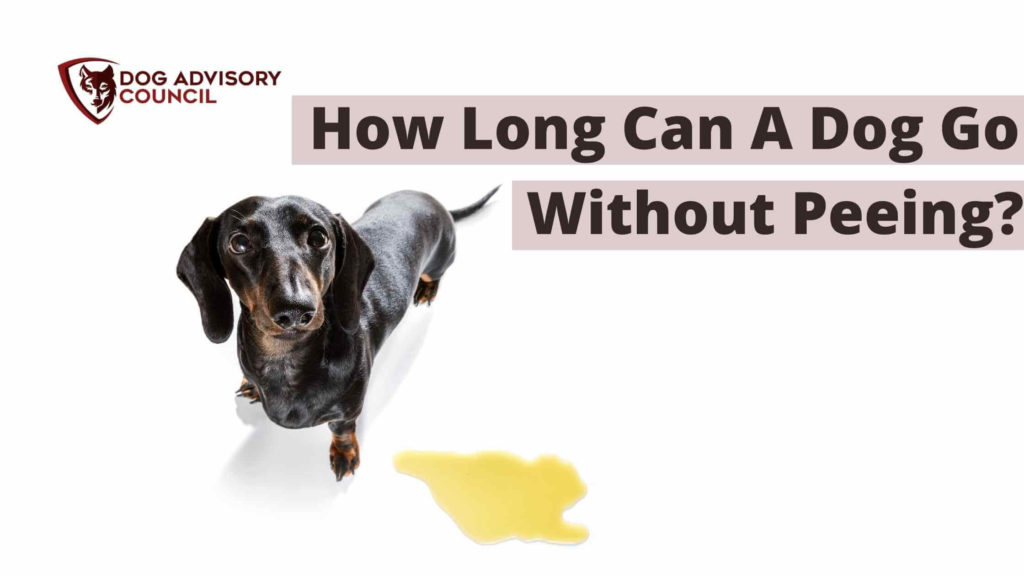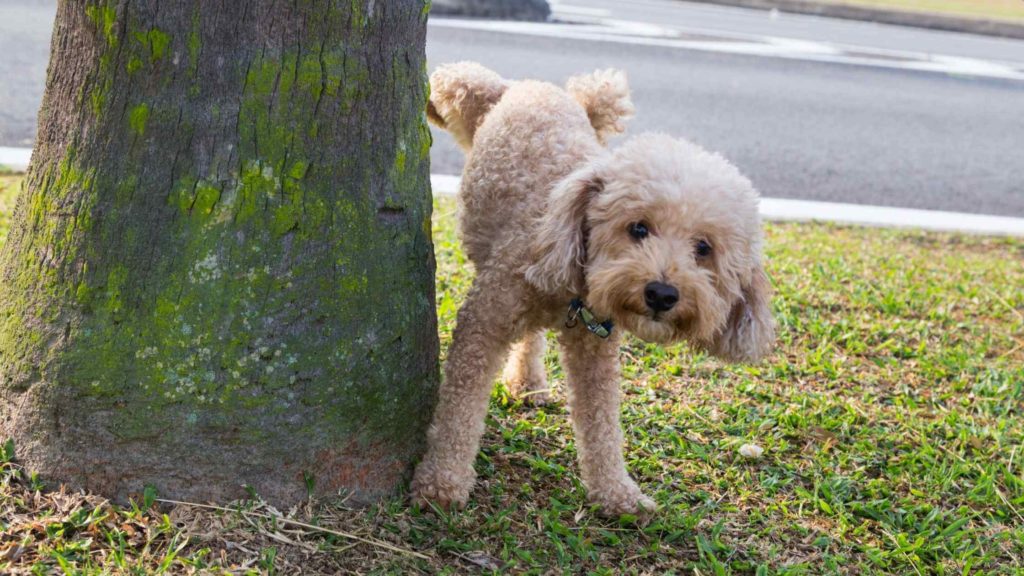
Find yourself wondering about your dog’s peeing habits? Especially when it comes to learning how long can a dog go without peeing? All you need to know is below!
In most cases, adult dogs can go between 8-and 10 hours at a time without peeing. This will fluctuate depending on breed, bladder size, and hydration frequency. While they’ve adjusted to this to keep from going in the house while we are at work, this isn’t considered healthy. It’s a good idea to allow your dog the opportunity to go outside to pee more often than that. Puppies and senior dogs won’t be able to hold their pee for quite as long due to sizing and health concerns.
How long can dogs hold their pee?
There is no correct answer to this question since a dog’s schedule for peeing will depend on quite a few things! If you’re looking at getting up close and personal with that schedule, however, here’s what you should know about the factors:
- Your dog’s breed
- Your dog’s size
- Your dog’s health
- Your dog’s hydration level
- Your dog’s emotions
Your dog’s breed
One breed won’t be able to hold it as long as other dog breeds, dependent mainly on the idea that every dog’s bladder size, from breed to breed, will be a little different. Your breeder will be able to offer some specialized information on your dog’s specific size when it comes to their bladder!
Your dog’s size
As briefly introduced, your dog’s size will also determine how long they can hold their pee. This makes sense since the smaller the bladder, the smaller the ability to hold in their pee! This is somewhat helped by the reminder that a smaller body won’t produce as much urine as a larger body.
Depending on your dog’s size, he’ll need to go more often than every 8 hours, or perhaps less than that. This is just an average only, though!
Your dog’s health
Dogs in good health, much like humans, will be able to hold their pee for much longer than those who are not. If your dog has kidney issues, bladder concerns, or something like diabetes or any health condition. In that case, this average may be much lower! The harder the body works on keeping itself in good health, the less attention it has to focus on health habits!
Your dog’s hydration level
If your dog doesn’t drink, it won’t need to go as often as a dog lapping up water every 10 minutes. Many dogs will adjust their hydration to match their owner’s availability for that reason! They’re pretty smart creatures!
Regardless of that, you should always make sure that your dog has access to fresh water all day long, even if there is a chance that they might not touch it.
Your dog’s emotions
We’ve all been around those dogs who get excited and start to pee, right? If your dog is excited or scared, they won’t have as much control over their emotions as a calm dog who is in control of themselves. Much like your dog’s physical health, your dog has “more important things” (like their emotions) to worry about!
How long is too long for a dog not to pee?
There is no set number one way or another, realistically. However, most experts agree that a dog who goes longer than 10 hours in a row has gone too long without peeing! This can often be a symptom of a brewing health problem, so it’s important to note when this is happening and any other symptoms of a health problem that you might see!
The other thing to focus on is whether this behavior of not peeing is a sudden behavior change or not. Any time there is an abrupt change of behavior, including pee habits, it’s good to take your dog to the vet to see if something is going on.
A dog who suddenly isn’t peeing could be dealing with poisoning, an urinary tract infection (UTI), or a stomach issue. A dog who suddenly is peeing every hour could have an issue with their kidney or bladder health.
Issues when dogs hold their pee for too long
Like humans, dogs can have health concerns if they hold their pee for too long, which can be short-term or long-term.
While it’s okay to expect a dog to hold their pee longer than usual every once in a while, don’t get in the habit of regularly making them go 10 hours or more if you have another option! Some of the potential health issues from a dog holding pee for too long include:
- UTI
- Kidney problems
- Poor bladder health
- Incontinence
The more strain that your dog puts on their bladder, the more help it will need. UTIs aren’t serious if they’re treated right away, but often owners don’t know that their dog has one until it’s set in. This means antibiotics and discomfort for your dog.
Depending on the problem, kidney and bladder health problems can require extra vet visits, specialized diets, and even long-term medication.
Is it normal for a dog not to pee for 24 hours?
It’s not normal for a dog to pee for 24 hours, as it means that they are dehydrated or something is going on in their body that is preventing them from peeing (such as bloat, for example.) If you know that your dog hasn’t peed in 24 hours, a vet visit is an excellent idea to see what the problem is!
Can a dog go 16 hours without peeing?
A dog can go 16 hours without peeing in their space in rare cases. However, they will need to go as soon as possible and may even start to relieve themselves as they move from the inside to the outside, so take note of that!
It’s never a good idea to ever test out this theory since holding their pee this long intentionally can harm their bladder and cause a lot of emotional distress as they try to hold it in more and more since they will seriously need to go by the end of the 16 hours.

Why does my dog not want to pee?
If you are concerned that your dog doesn’t have to pee, there could be a few reasons for this sudden shift in behavior. Some of the most common reasons for not wanting to pee include:
- Dehydration
- Illness
- Poison
- Emotional distress
These will have other symptoms that you can look for, too, which will support you in finding out what’s going on. Note these down, and then call your doctor to have them recommend what to do or whether or not you should bring them in for a check-up or visit.
When should I worry about my dog not peeing?
Generally, any time your dog is not peeing for no reason, it’s a worry. Specifically, though, you can be especially concerned on two occasions: if the behavior is out of the ordinary and you aren’t sure what’s going on, and if they are actively trying to pee but aren’t able to do so.
Both of these often will be signs of something serious and emergent going on. You’ll want to get them to the vet as soon as possible to have them take a look!
How do I force my dog to pee?
Are you feeling concerned about your dog’s lack of peeing? You may want to force them to pee just to make sure that everything is okay. Or, you’re trying to leave for work, and you want to know that they’ve gone before.
The best way to get them to pee is to include a “go pee” command when teaching their obedience training. This will help them understand that it’s now or never as far as going outside to sniff around and do their thing. This is a great way to ensure that the last thing you do is get them to pee before you leave, too.
What can I give my dog to help him pee?
If you’re trying to give your dog something to help them pee, you’ll want to focus on water content. Always give them access to fresh, cool water that is strategically placed where they can access it quickly and easily.
Another thing is to give them some wet food, such as dog gravy or canned food. This will help them get extra water content and have to go.
Mashed pumpkin and plain boiled white rice can help them go, too! These also are great healthy treats for dogs, so they’ll help him get back to his regular peeing schedule sooner rather than later.
How long after a dog drinks water does it need to pee?
Puppies will have to go as soon as 10 minutes, and perhaps senior dogs. Most healthy adult dogs will have to go anywhere from 30-60 minutes after drinking water. Of course, it will depend on how much they drank and their health and emotional status.
How long can my puppy go without peeing at night?
A puppy will have a small bladder, so taking them out at night will be part of puppy training. You can expect your puppy to be able to hold their pee for approximately 1 hour for every month of the age that they are. However, this is approximate, so pee pads or a proper schedule will be essential!
Can a dog go 12 hours without peeing at night?
Yes! After all, a dog is used to sleeping overnight, so dogs can go 12 hours without peeing at night if they are sleeping! However, your dog will need to go when they get up, much like humans. Be prepared to waste no time getting him out as his body wakes up!
How often should a dog pee?
Generally, dogs should go pee about 3-4 times per day, often spread out in 3-4 hours as far as outings. You’ll notice that this often is geared toward timing after meals and then once or twice in the afternoon and evening.
Is it okay for a dog to pee once a day?
Peeing once a day is not a good sign unless you already know your dog’s underlying health condition. If they are only going 1 time per day and seemingly okay, your dog is most likely very dehydrated and could be damaging their health and organs. Take them in to see a vet if they are only peeing once a day for no apparent reason!
In conclusion
Healthy, adult dogs can for 8-10 hours without peeing if they have to. This is a typical schedule for dogs with parents who work standard shiftwork jobs. However, this pee timing can depend on several things, including breed, size, general health, emotional health, and age.
Dogs are masters of their bladders, so going every 8 hours or so is something they can adjust and adapt to as needed. Going too long between pees can damage your dog, so be aware of what to look for and how to organize your dog’s pee schedule to prioritize their health!
Just make sure that you let them out regularly when you are home since it’s not an excellent long-term habit!
